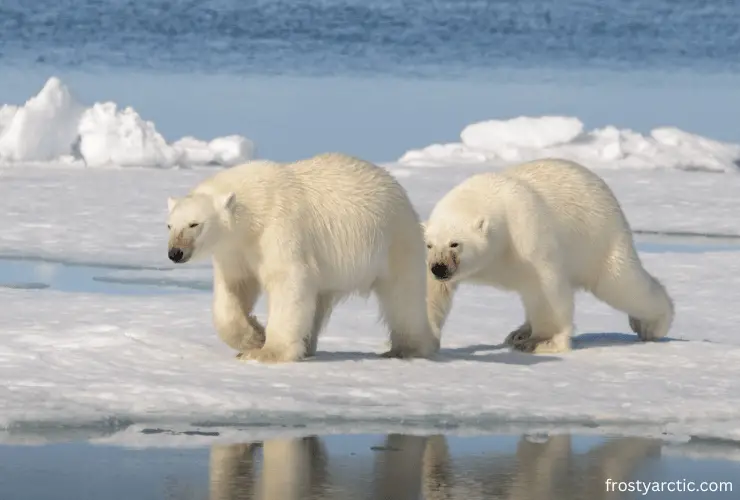Polar bears can smell 32 kilometers (20 miles) away. Their sense of smell is incredibly strong and acute. Moreover, they can smell their prey from several kilometers away, even under layers of ice and snow. Their excellent sense of smell is due to the combination of biological adaptations and evolutionary pressures.
Are there any other animals that have a strong sense of smell just like incredible polar bears? What do you think the role of sense of smell in polar bears’ survival in the Arctic environment? All these curious queries are about to be answered accurately in this article. Stay tuned and discover the hidden intricacies of the scent sensitivity of polar bears!
How Far Away Can Polar Bears Smell?
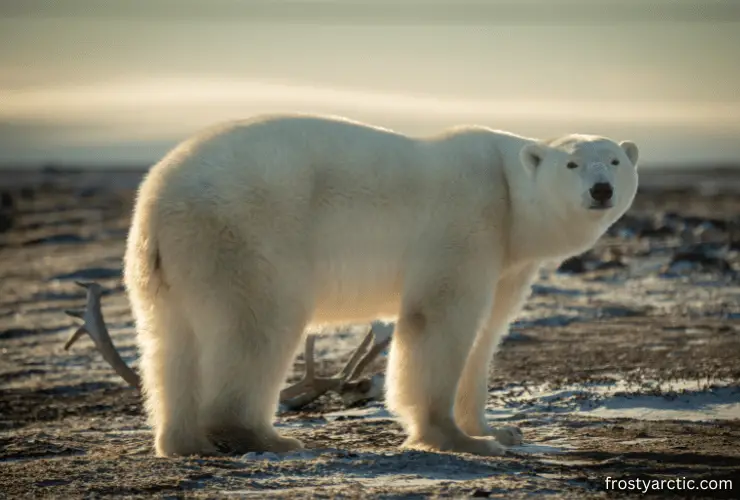
There is no doubt that polar bears have an amazing sense of smell. According to various studies, polar bears have the best sense of smell than other bear species present in the bear family.
“Polar bears can smell their prey, food, humans, and many other things from more than 20 miles away. Some polar bears can smell more far away than their average sense of smell. Their sense of smell can reach up to 40 miles away from the smell of meat.” ~ Source
Here is a complete documentary about the strong sense of smell of a polar bear.
How Far Can a Polar Bear Smell a Human?
The sense of smell of a polar bear means you are in the region/country of a polar bear. How far can they smell your camp or car if you are in their territories? They have a sharp sense of smell that helps them to locate your camp from a radius of 20 to 40 miles.
This shows polar bears can smell humans and their food from 40 miles away. That’s another reason why some people keep their food secure and keep it fully covered when they go hiking or camping. Use no-odor bags if you are in a country of polar bears. All because there are possibilities that they could get attracted to you or your camp.
Fun Fact Time
Polar Bears can detect their prey through more than 3 feet of ice. Their long noses and olfactory anatomy help them to leave the competitors behind!
How Far Away Can a Polar Bear Smell a Seal?
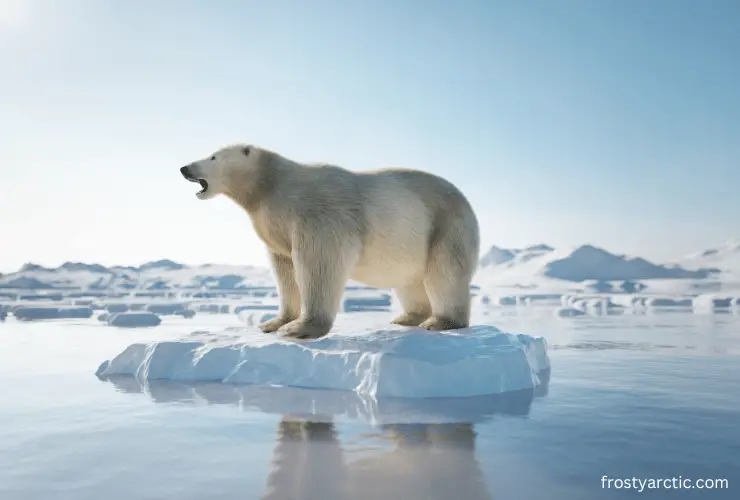
Seals are the primary prey of polar bears. And the nose of polar bears is very powerful to smell their prey. Polar bears smell a seal from 20 miles (32 kilometers) away on the ice. As you know, seals create breathing holes to come out of the water to breathe.
So, if the seal is in the water, polar bears can smell the breathing hole from more than half a mile. The San Diego Wildlife Alliance Animals and Plants Zoo organization also reported this fact. It said:
“Den of the seals are mostly covered with snow, but polar bears know how to locate them even under the snow. They can even find the air hole of the seals from more than 1.6 kilometers (up to 1 mile) away in the ice.
That’s the reason why some people call polar bears “noses with legs”. It sounds cute and hilarious at the same time. The strong sense of smell is incredibly helpful to survive in the harsh environment of the Arctic.”
Can Polar Bears Smell Well? What Smells Attract Them?
Yes, polar bears smell well. Their olfactory abilities are estimated to be one of the best among all bears and even many other animals. These abilities, like smelling from beyond our imagination, make them highly effective hunters in their Arctic habitat. Here are a few smells that can attract polar bears:
- Meat and blood
- Blubber and scent of seals
- Carcasses
- Food caches
- Human waste and garbage
- Cooking odors
- Fuel odors
- Chemical and unusual odors
The behavior of polar bears varies towards many odors. Their attraction to certain smells depends on various factors like hunger, availability of natural food sources, and environmental conditions.
How Do Scientists Know That Polar Bears Can Smell Things 20 Miles Away? What Is the Test?
Scientists use various tricks and conduct a variety of tests to determine how far they can smell their prey. They use food methods frequently. In the case of polar bears, they use fish or a piece of meat and place it at a distance of 20 miles away. Then, they observe the reaction of the polar bear toward the targeted prey.
In this way, scientists came to know that polar bears can smell things 20 miles away. According to one of our Quora Digest colleagues, scientists used a special machine known as an olfactometer to measure the concentration of odor molecules in the air at different distances from the polar bear. Additionally, scientists study their nasal cavities to understand how they process smells. ~ Source
Polar Bears’ Sense of Smell Vs Other Animals and Insects’ Sense Of Smell
Here is a quick comparison table that shows the difference between the sense of smell of a polar bear and some other popular animal’s sense of smell:
| Animal Name | How Far It Smells? |
| Polar Bears | 20 to 40 miles |
| Deer | 1 to 4 miles |
| Dog | 12 to 40 miles |
| Elephants | 12 to 20 miles |
| Shark | 0.25 to 3 miles |
| Mouse | 7 to 10 miles |
| Moth | 5 to 7 miles |
| Grizzly bear | 12 to 20 miles |
| Vulture | 1 to 2 miles away |
| Ant | Hundreds of miles away |
| Snakes | 4 to 5 miles |
| Kiwis | 5 to 7 miles |
| Cows | 5 to 6 miles |
| Cats | Up to 4 miles |
What Smell Do Polar Bears Hate?
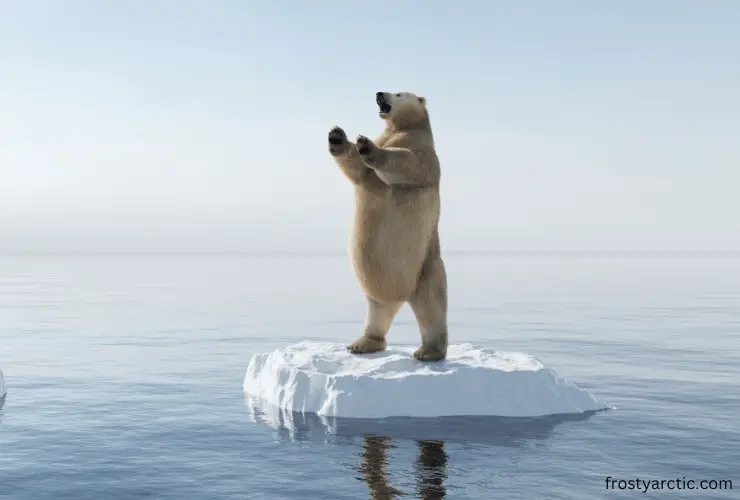
There are many smells that repel polar bears. In simple words, polar bears do not like these smells. The smell of strong pine scent, vinegar, bleach, and ammonia are at the top of the list of smells that repel polar bears.
You can spray or spread the smell of these things in those places where you don’t want the polar bears to hang out there. However, don’t try to make a mixture of these chemicals as you can harm your own self, or you can make harmful gasses that could affect the environment and your health.
According to the report of the USDA Forest Service, spreading pepper or cayenne is the best option to annoy polar bears. The polar bears hate the irritants in the pepper 🌶️. Placing cups of household ammonia is another unique way to keep polar bears out of your sight. They don’t like the odor of ammonia acid.
Polar bears also do not like market-made or homemade bear repellents. You can soak a cloth in these repellents to avoid polar bears. Plus, you can hang out plastic containers or place them near your living places or camps to get rid of polar bears.
What Are the Factors on Which The Sense Of Smell Of Polar Bears Depends?
Many factors can affect the sense of smell of a polar bear, temporarily or permanently. Let’s discuss each factor in detail:
1. Temperature & Wind Direction
Polar bears will not locate their prey human through scent if the air is dead calm and the body temperature of the prey is significantly warmer. Thus, wind speed and air temperature can make the difference in how far they can smell their target.
If the wind is strong, the scent of the prey or a human will spread more. Similarly, if the air is cold, the living bodies produce more scents.
2. Type of Smell
The type of smell affects the sense of smell of a polar bear. The strong and pungent smells are likely to reach the nose of polar bears more often than casual scents. Several foods, blood, and meat have strong and pungent smells. These smells attract their attention and trigger a response.
3. Polar bear and prey Location
The distance between the prey and the polar bear matters a lot. The locations of both the polar and the prey influence the ability of the polar bear to detect scents. If the prey is far apart, the smell will be mild, and the polar bear would be unable to locate the prey. If the prey is near, the ability of polar bears to detect the prey would be heightened.
4. Weather Change
Everybody knows that climate change is the first and foremost threat to polar bears. Due to less ice and changed wind patterns, polar bears’ sense of smell is affected. Speedy winds are causing interruptions in the way of their smelling abilities.
The speedy winds keep them distracted and make it hard to locate seals. Thus, climate change is definitely a threat to their survival. Moreover, they are sometimes not able to locate their mate and their population is decreasing.
What Are the Other Benefits of A Polar Bear’s Sense Of Smell?
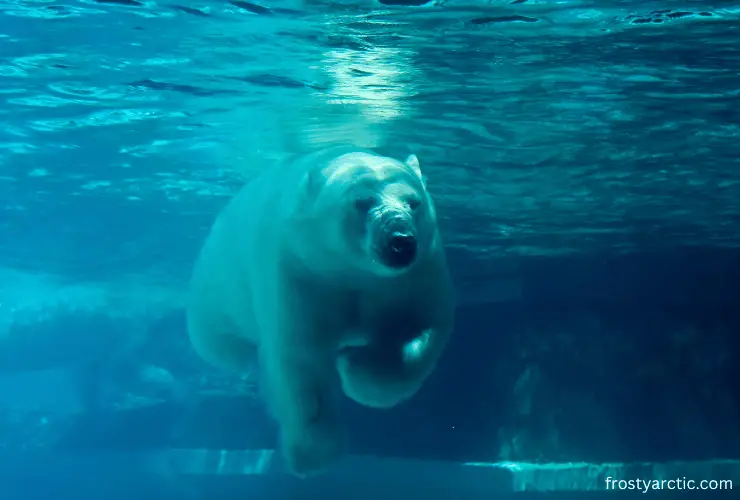
Here are the other benefits of polar bear’s sense of smell other than finding their prey:
1. Find Mate
The sense of smell of a polar bear helps them to locate their mate. They find their mate in the months of reproduction season with a sense of smell. Many studies suggest that polar bears leave their unique scent on the icy floor when they walk.
And, every polar bear has its own unique scent, different from other polar bears. The scented trail helps to communicate a polar bear’s specific identity. This may include its gender and breeding readiness, to other polar bears in the area.
2. Keep the Cubs and Mother Together
The mother of the cubs always keeps their nose on her cubs. Their cubs have their own distinct sense of smell. The mother’s sense of smell keeps them located and unites them easily. Both the mother and cubs stay together.
In addition to the above, there is a lot of danger and threats to the cubs in the Arctic. So, mothers’ sense of smell helps them to be well aware of any threat, other polar bears, and dangerous animals. They can quickly get a clue that a threat is nearby. So, she keeps the cubs in a safe location.
Frequently Asked Questions
Which animal has the best sense of smell?
This question is always a big debate. Many researchers say that polar bears are at the top of having the best sense of smell. However, many experts claim that African elephants have the best sense of smell. Elephants have more votes in having the best sense of smell than any other animal. Great white sharks and African giant pouched rats also have the best sense of smell.
Can polar bears smell underwater?
Yes, polar bears can smell underwater. Their specialized sense of smell helps them to detect odors even when submerged. However, it depends on various factors like the material underwater, the distance, and environmental conditions. Here is an amazing video where a polar bear is after its prey in the water.
Can polar bears smell food in a freezer?
Yes, polar bears can smell food in a freezer. They can easily detect the food even if it’s inside a closed-door freezer. Our Reddit colleagues also do not deny the fact about the extraordinary sense of smell of polar bears.
Do polar bears smell bad?
Yes, the smell of polar bears is not pleasant to human noses. Their odor is described as musky or oily due to excessive oils in their bodies. This odor is part of their natural scent. Furthermore, this scent is strong to humans, but it doesn’t mean it is an indication of “bad-smelling“.
Is the polar bear’s sense of smell better than a human’s sense of smell?
Yes. The sense of smell of a polar bear is 2100 times better than the sense of smell of a human. Their long noses work like “culprits” to help them live their lives. They don’t care if their prey is 5,249 feet away from them, they’ll catch them with the help of their natural body scent. ~ Source
Conclusion
Polar bears’ mind-blowing sense of smell helps them to follow the footprints of their prey. They use crosswind movement methods to locate the seals and food. You know this is a unique behavior that is not observed in any mammal, but only in birds and insects.
When they are unable to see in the foggy and dark environment, they use the crosswind technique to arrange something for their dinner. According to the study, their sense of smell is the best in the entire animal kingdom.
Hope you enjoyed reading about one of the intriguing senses of polar bears. Don’t miss any further topics, their seeing and hearing abilities are just a few articles beyond. Stay connected, stay safe!

